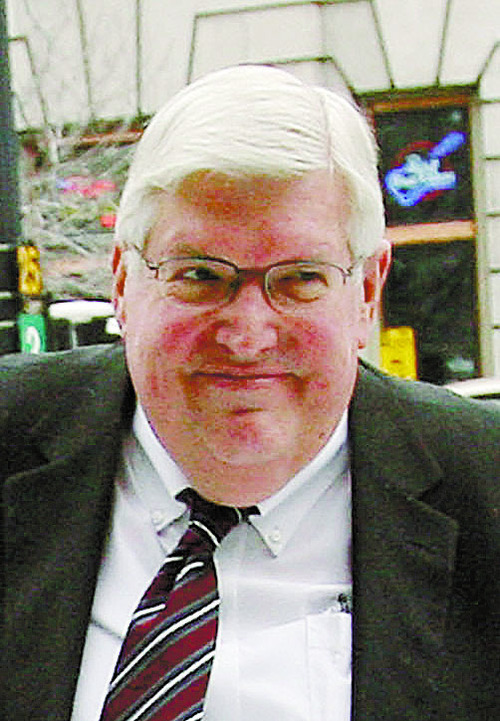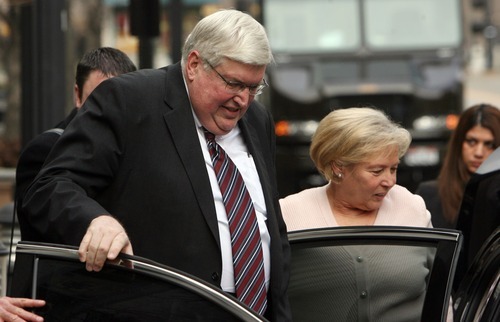This is an archived article that was published on sltrib.com in 2012, and information in the article may be outdated. It is provided only for personal research purposes and may not be reprinted.
He was convicted on multiple felony counts of illegally prescribing pain medicine and sentenced to prison.
But today, five months after jurors pronounced him guilty, Brigham City orthopedist Dewey C. MacKay remains licensed to practice medicine in the state of Utah.
Why — whether it's due to a procedural delay or for legal or political reasons — isn't entirely clear. The state Attorney General's Office, which would file any request for sanctions, has been mulling the matter since MacKay's Dec. 19 sentencing. Officials there declined to comment.
Utah's Division of Occupational and Professional Licensing [DOPL] has placed a hold on MacKay's license, which means the doctor can't automatically renew it after its routine expiration date at the end of January, said division director Mark Steinegal on Monday.
The agency hopes to take further disciplinary action. Punishment sends a message and carries more weight, said Steinegal, explaining that absent some form of sanction, MacKay retains residual rights to his license for two years and could easily have it reinstated.
"This case is about as related as you can get to our practice laws. It was in the course of his practice that [MacKay] inappropriately acted, causing the death of one person," Steinegal said.
While MacKay's attorneys insist he has retired, Steinegal said, "I don't care whether he's going to practice. I care whether he has the right to practice."
Whether DOPL is angling to revoke the doctor's license, suspend it or slap probationary restrictions on it, Steinegal wouldn't say.
While DOPL officials can recommend sanctions, it is up to the state AG to bring them before administrative law judges. Like county-level criminal prosecutors, the office has discretion over which civil penalties to pursue, he said.
MacKay's lawyers say stripping him of his license at this point would serve no practical purpose.
MacKay was convicted by a federal jury in August after a five-week trial on 40 counts related to illegally distributing painkillers, including counts related to a man's death.
He lost federal permission to prescribe controlled substances in 2009, a decision he fought unsuccessfully. He has not filed to renew his medical license.
"There would be no point... He has retired from the practice," said his lawyer Peter Stirba.
But the 64-year-old doctor remains free while his lawyers appeal a ruling in the case. Backed by prominent Utahns, including a legislator and congressmen who pleaded for leniency in his sentencing, MacKay is appealing his verdict, his 20-year sentence and a judge's order that he report to prison on Feb. 1.
Should he prevail, nothing currently bars him from returning to medicine, performing surgeries and writing prescriptions for any drugs that are not controlled substances, which include painkillers.
"It's asinine," said Tyler Wirick, the nephew of David Wirick, who died using drugs prescribed by MacKay. "What happens if he were to leave the state, all this blows over, and he heads to Missouri?"
An attorney in Idaho, Tyler Wirick is a believer in due process. But he wonders, if a felony conviction isn't enough to merit losing one's medical license, what is?
"This guy was no better than a drug pusher," said Wirick. "As a physician his first duty is to do no harm. He violated that duty and didn't meet a fundamental standard of care."
Under state law, a felony conviction is among a laundry list of offenses for which a doctor can lose a license.
But nothing, not even murder or sexual assault, merits automatic revocation. And no revocation is permanent since doctors can always petition to reinstate their license.
Some states are exploring penalizing sex offenses with automatic, permanent revocation.
In conservative, regulation-light Utah, only pharmacists are at risk of immediately losing their license due to a felony conviction. And there's legislation pending this winter to eliminate that penalty, Steinegal said.
Twitter: @kirstendstewart
—
The Dewey MacKay case
Dewey MacKay's conviction stems from charges filed in 2010 related to his prescribing more than 1.9 million hydrocodone pills and nearly 1.6 million oxycodone pills between June 1, 2005, and Oct. 30, 2009.
It's unclear how long Utah's Division of Occupational Licensing had been investigating the Brigham City orthopedist before referring the case to prosecutors.
Jurors in August convicted MacKay of two counts of distribution of a controlled substance resulting in a death, three counts of use of communication facility in a drug trafficking offense and 35 counts of distribution of a controlled substances. He was acquitted of 44 other distribution counts and has appealed the verdict. —
The Dewey MacKay case
Dewey C. MacKay's conviction stems from charges filed in 2010 related records that he prescribed more than 1.9 million hydrocodone pills and nearly 1.6 million oxycodone pills between June 1, 2005, and Oct. 30, 2009.
It's unclear how long Utah's Division of Occupational Licensing had been investigating the Brigham City orthopedist before referring the case to prosecutors.
Jurors in August convicted MacKay of two counts of distribution of a controlled substance resulting in a death, three counts of use of communication facility in a drug trafficking offense and 35 counts of distribution of a controlled substances. He was acquitted of 44 other distribution counts. He has appealed the verdict.





